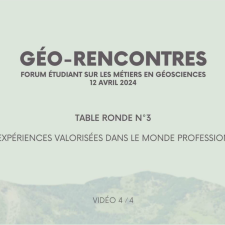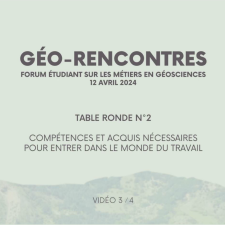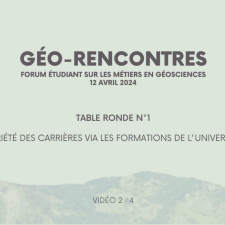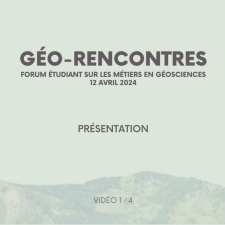Notice
The Sustainability of Kyoto's Architecture: Where Did the Victims of Climate Change Go?
- document 1 document 2 document 3
- niveau 1 niveau 2 niveau 3
Descriptif
cept of “expropriation” in the case of territories exposed to a rise in sea levels. The premise of my project is that although future generations in all countries will be affected by climate change, the inhabitants of poor countries and small island states will be especially hard hit in less than 30 years; however, their situation has been neglected by the current international regime. This neglect can be demonstrated and explained using approaches from political science (mainly policy analysis and the Advocacy Coalition Framework by Sabatier), which says that the decisions behind privileged tradable pollution rights and the valuation of mitigation over adaptation strategies, among other policy instruments, have been pushed forward by powerful actors who clearly benefit from this institutional framework. Emission markets and mitigation strategies will not have any short or middle term effects in attenuating the damages that will hit poor and coastal countries. Thus, it is necessary to empower these territories by adding juridical arguments to the ethical ones that have already been advanced in 54 requiring compensation from states that are historically responsible for the short- and intermediate-term rise in sea levels. Actually there isn’t any property right to the climate system. Therefore, the possibility of protecting this resource is quite limited because without ownership no legal action can be undertaken in the case of third party damages. Thus, a “right to a stable climate” seems to be currently inadmissible in any court of justice. One way to deal with this problem is the use of the concept “expropriation”. According to many national laws the state must provide compensation when land owners are restricted in their uses of their property as a result of state activity. In principle, such a legal provision could reinforce the position of those who will suffer from a loss of use rights due to a rise in sea levels. Although there are still many political obstacles to suing a state or a private actor on the grounds that it is emitting GHG, the concept of “expropriation” emphasises the need for a form of compensation for the victims of climate change, a new burden-sharing agreement and open doors to legal and political actions.
Dans la même collection
-
Round Table
JoussaumeSylvieChanzyAndréSomervilleRichardDuvalRomainThe European Science Foundation (ESF) and the French Foundation of the Maison des Sciences de l’Homme (FMSH) (within the Entre-Sciences programme) have agreed to jointly develop a new conference
-
The Start and the End of Our Interglacial
BergerA.The previous interglacial (Marine isotope stage 5e, peaking at 125 kyr BP) is usually assumed to be a good analogue for our present-day climate. Moreover, as our present interglacial, the Holocene, is
-
Cross-Disciplinary International Research on Land-Atmosphere Interactions
ReissellAnniThe presentation will focus on scientific issues of importance to global change and climate change research: interactions of reactive trace and greenhouse gases between the biosphere and atmosphere in
-
Regional Climate Change and Extremes
DéquéMichelGlobal coupled ocean-atmosphere models, driven by greenhouse gas concentrations according to several hypotheses for the next century, have been used in the last IPCC-AR4 report to depict possible
-
Recent Trends and Vulnerabilities in the Carbon Cycle
CiaisPhilippeWe shall address the coupling between atmospheric circulation and the modelling of ecosystems, to have a better understanding of the carbon cycle, perturbed both by land use and Climate Change. The
-
Interlocking Natural and Social Systems - Resilience, Governance and Research Policy Considerations
SvedinUnoIn this presentation the start is made from the 2007 IPCC statement that it now seems consolidated that there is a clear sign of the importance of the anthropogenic factors in the climate change
-
The Intergenerational Equity: A Concept to Build for Sustainability, the Case of Global Warning
DjédjéOkoubi Franck DidierDefined as “the relation that each generation has with the last or future generations in the use... of the natural or cultural resources of planet”, Intergeneration equity (here I.E) imposes rules of
-
Comparison of Simulated Tree-Ring Cellulose d180 at the European Scale
DanisPierre-AlainIn order to investigate factors involved in the inter-annual variability of d180 in tree ring cellulose (d18OTRC), we simulated the d18OTRC from 1960 to 2001 over Europe. We used 1) simulated climate
-
Borehole Climatology and Model Simulations: Steps to Integrated Assessment
Gonzales RoucoJesus FelipeProgress in understanding climate variability through the last millennium leans on simulation and reconstruction efforts. Exercises blending both approaches present a great potential for answering
-
Food demand, Productivity Growth and the Spatial Distribution of Land and Water use: A Global Model…
PoppAlexanderNowadays, human society appropriates about one quarter of total net primary production of the terrestrial biosphere. Production of food, energy and materials, and the related use of land and water
-
Turning Hazards into Ressources? Climate Change, Floods and Coastal Wetlands in the Costa Brava (No…
Serra-LlobetAnnaAccording to the IPCC Fourth Assessment, one of the most vulnerable areas in Europe are coastal zones. This is due to sea level rise combined with increased risks from storms. Coastal wetlands, in
-
Debate
HourcadeJean-CharlesSomervilleRichardSvedinUnoDuvalRomainThe European Science Foundation (ESF) and the French Foundation of the Maison des Sciences de l’Homme (FMSH) (within the Entre-Sciences programme) have agreed to jointly develop a new conference
Avec les mêmes intervenants et intervenantes
-
Debate
CallonecGaëlDupuisJohannThoronSylvieThe European Science Foundation (ESF) and the French Foundation of the Maison des Sciences de l’Homme (FMSH) (within the Entre-Sciences programme) have agreed to jointly develop a new conference
Sur le même thème
-
Géo-Rencontres 2024 / Les expériences valorisées dans le monde professionnel
LilloEmmaAraujoJulieHuartFlorianDubreuRomainBuquetDamienChazalLauraBorieMarianeForum sur les métiers en géosciences organisé par les étudiants du CMI Ingénierie Géologique et Civile, Université de Bordeaux, 12 avril 2024
-
Géo-Rencontres 2024 / Compétences et acquis nécessaires pour entrer dans le monde du travail
BrinonJulietteAmoleFili-FenuaPretouFrédéricCampetHugoLiébauxAlbinDe AlemeidaMarie-LouPoirierAymericDufrenoyAudreyForum sur les métiers en géosciences organisé par les étudiants du CMI Ingénierie Géologique et Civile, Université de Bordeaux, 12 avril 2024
-
Géo-Rencontres 2024 / Variété des carrières via les formations de l'université
InguimbertDianeLacazeRomaneLemaitreLaurieChazalLauraMontjeanPascalPoudevigneJacquesPortefaixFrédéricForum sur les métiers en géosciences organisé par les étudiants du CMI Ingénierie Géologique et Civile, Université de Bordeaux, 12 avril 2024
-
Géo-Rencontres 2024 / Présentation
LatasteJean-FrançoisLavieThéoForum sur les métiers en géosciences organisé par les étudiants du CMI Ingénierie Géologique et Civile, Université de Bordeaux, 12 avril 2024
-
Tokyo, plus grande « ville » au monde : aménager et gouverner la démesure
Languillon-AusselRaphaëlAvec ses quelques trente-cinq millions d’habitants, Tokyo est la « ville » la plus peuplée au monde, et l’une des métropoles les plus riches. Cette présentation vise à décrire, analyser et expliquer,
-
Les fluctuations conjoncturelles de l’activité
Maveyraud-TricoireSamuelLes fluctuations conjoncturelles de l’activité
-
Les fluctuations du revenu courant et le lissage de la consommation
Maveyraud-TricoireSamuelLes fluctuations du revenu courant et le lissage de la consommation
-
L'origine des fluctuations de la demande
Maveyraud-TricoireSamuelL'origine des fluctuations de la demande
-
L'approche par la dépense du PIB et les grandes fonctions macroéconomiques
Maveyraud-TricoireSamuelL'approche par la dépense du PIB et les grandes fonctions macroéconomiques
-
-
-














